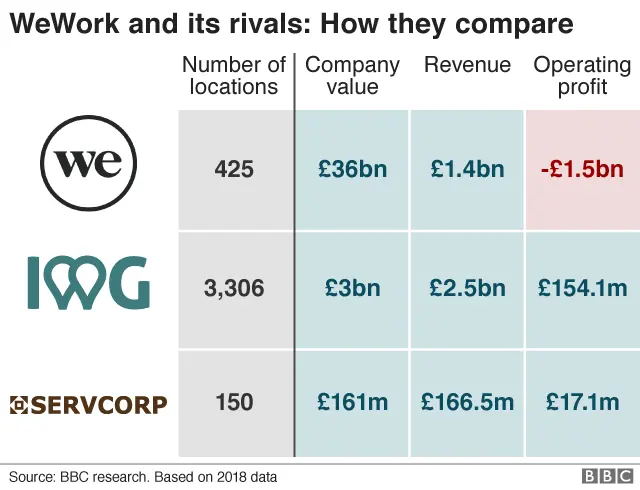WeWork: The rise and fall of co-founder Adam Neumann
 Getty Images
Getty ImagesAdam Neumann led WeWork, the property firm he co-founded in 2010, to become a global juggernaut and a symbol for office cool.
The company has more than 500 locations in 29 countries and as recently as August, had viewed Mr Neumann as central to its fortunes.
But on Tuesday, WeWork announced that he would step down as chief executive and relinquish significant control over the company, after the firm's plans to sell shares publicly ran into trouble.
It marks a startling fall from grace for the ambitious 40-year-old billionaire.
So what's his story?
From kibbutz to co-working
Born in Israel, Mr Neumann served in the Israeli Navy before moving to New York to "get a great job, have tons of fun and make a lot of money", as he put it in a 2017 TechCrunch interview.
He enrolled at Baruch College at the City University of New York in 2002, but dropped out just shy of graduation to go into business.
One of his early ventures was a baby clothing company that evolved into the luxury Egg Baby brand.
Later, he and business partner Miguel McKelvey, an architect, renovated an office space and sublet the property. They sold the business but the idea grew into WeWork.
 Getty Images
Getty ImagesIn interviews, Mr Neumann - who finally got his degree in 2017 - has tied WeWork's origin story to his own, linking his itinerant childhood and time spent living on a kibbutz to WeWork's emphasis on communal working.
He told Israeli newspaper Haaretz in 2017 he sometimes even refers to WeWork as "Kibbutz 2.0".
Easy money
Mr Neumann's colourful personality once charmed investors, including Japanese investment giant Softbank, a major backer of WeWork.
Softbank Chief Executive Masayoshi Son reportedly worked out the terms of one of its investment rounds during a car ride, after a 12-minute tour of WeWork's New York offices.

Softbank's investments helped the company reach a peak valuation of about $47bn (£37.7bn) despite steep, ongoing losses - a mismatch that has drawn repeated questions.
Mr Neumann attempted to address that puzzle, telling Forbes in 2017: "Our valuation and size today are much more based on our energy and spirituality than it is on a multiple of revenue."
Blurred lines
WeWork's growth made Mr Neumann a billionaire, with an estimated net worth of $2.2bn, according to Forbes.
His glamorous personal life - his wife Rebekah is the cousin of actress Gwyneth Paltrow, while his sister Adi is a former model who was once a Miss Teen Israel - contributed to the buzz around the company.
But the mixing of work and pleasure - which had been a key element of WeWork's culture - became a problem as the firm set out plans to go public.
Potential investors questioned the links between Mr Neumann's personal finances and WeWork, as well as his decision to expand WeWork into areas of personal interest, such as surfing and a school.
They also raised questions about his judgment amid complaints about his hard-partying ways.
 Getty Images
Getty ImagesMagic fades
WeWork tried to respond to those concerns. Among other steps Mr Neumann returned $5.9m in stock he received for selling WeWork the trademark "We".
But even the announcement on Tuesday that Mr Neumann would step aside and reduce his voting power failed to quell questions about WeWork's long-term prospects.
Critics have long said WeWork was little more than a typical real estate company, and its shaky finances had been obscured by Mr Neumann's personal style.
